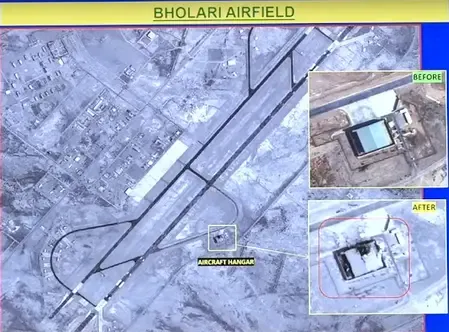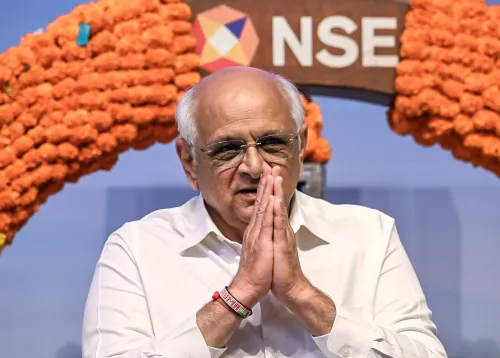What Are the Consequences of 'Operation Sindoor'?

Synopsis
Key Takeaways
- 20% of Pakistan Air Force infrastructure destroyed.
- Significant losses to fighter jets and personnel.
- India's strategic shift in counter-terrorism.
- International support for India's actions.
- Focus on terrorism in future talks regarding Kashmir.
New Delhi, May 14 (NationPress) As the aftermath of India's 'Operation Sindoor' unfolds, the extent of the losses and destruction on the Pakistani side is becoming clearer, revealing the heavy toll it has incurred for its role in supporting terrorism within Indian borders.
Recent reports from credible sources indicate that the Pakistan Air Force has faced significant setbacks, with 20 percent of its infrastructure reportedly devastated due to Indian airstrikes.
Numerous fighter jets have been obliterated, and estimates suggest that more than 30-40 Pakistani soldiers have lost their lives.
'Operation Sindoor' commenced on May 7, marking India’s strategic and targeted attacks on terrorist strongholds in Pakistan and Pakistan-occupied Kashmir. However, the Pakistani military perceived these operations as assaults on its sovereignty, leading to unsuccessful retaliatory drone and missile strikes aimed at Indian military and civilian targets.
In response, the Indian armed forces executed a series of robust counterattacks, targeting several of Pakistan's key airbases utilizing both indigenous and Israeli weaponry.
India struck a minimum of 10-11 airbases across Pakistan, many of which are known to host critical fighter aircraft. The operations resulted in extensive damage, destroying munitions depots and airbases such as Sargodha and Bholari, where the PAF’s F-16 and J-17 aircraft were stationed.
Among the casualties, 50 individuals were reported dead, including Squadron Leader Usman Yusuf and four airmen during the attack on the Bholari airbase in Jamshoro district, Sindh.
On Tuesday, the Pakistan Army acknowledged that 11 military personnel were killed and over 70 were injured during the recent conflict with India following the Pahalgam terror attack.
Indian Armed Forces have officially stated that between May 7 and May 10, 35-40 Pakistani soldiers were killed in the strikes.
Government officials have disclosed that, in addition to the loss of 20 percent of Pakistan’s air force assets, significant damage was inflicted on various Pakistani fighter jets, including the Chinese-made JF-17.
Military installations and airbases targeted included Nur Khan in Chaklala, Rafiqui in Shorkot, Murid in Chakwal, Sukkur, Sialkot, Pasrur, Chunian, Sargodha, Skardu, Bholari, and Jacobabad.
Satellite imagery reveals the extent of destruction at several airbases, including Shahbaz airbase in Jacobabad.
High-resolution satellite images display damage at multiple airbases in Sukkur (Sindh), Nur Khan (Rawalpindi), Rahim Yar Khan (southern Punjab), Mushaf in Sargodha, Jacobabad (northern Sindh), and Bholari (northern Thatta district).
The imagery shows large craters on runways and damaged aircraft hangars.
India's Gains from Operation Sindoor:
Operation Sindoor has marked a transformative shift in India's approach to terrorism, unveiling a new doctrine in the nation's counter-terrorism strategy.
Prime Minister Narendra Modi firmly stated that this will be regarded as the new standard, with any provocations from Pakistan leading to more severe reprisals.
India not only neutralized nine high-value terrorist launchpads linked to Lashkar-e-Taiba, Jaish-e-Mohammed, and Hizbul Mujahideen, but also penetrated deep into Pakistan's territory, emphasizing that acts of terrorism will no longer go unanswered.
Strategic targets such as Bahalwapur and Mudrike were also engaged, underscoring India’s determination to strike targets deep within Pakistan if the nation continues to harbor terrorists.
'Operation Sindoor' has highlighted a doctrinal shift in India's strategy, establishing a new threshold that Pakistan can no longer disregard.
The 23-minute operation showcased India's air defense capabilities and revealed significant vulnerabilities within Pakistan's air defense system, which was either circumvented or neutralized.
India's air defense was proven effective on the global stage, as no Pakistani projectiles or missiles reached their intended targets.
'Operation Sindoor' has sent a clear international message that India will take matters into its own hands, including targeting terrorist sites in foreign territories, and will not tolerate any external interference.
Unlike previous conflicts where India was urged to exercise restraint, this time, major global powers largely expressed support for India's right to protect its citizens and territory.
Furthermore, 'Operation Sindoor' has reinforced India’s narrative regarding Kashmir. For the first time, the Kashmir issue has been separated from India's right to combat terrorism, as the Prime Minister explicitly stated that discussions with Pakistan will only occur on two subjects – terrorism and the return of PoK.









